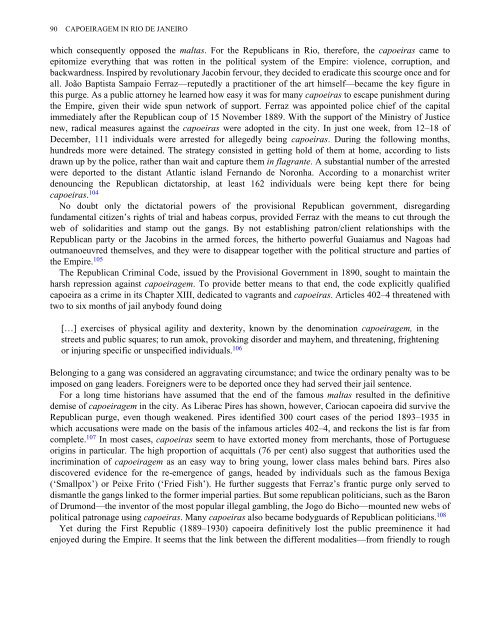Capoeira: The History of an Afro-Brazilian Martial Art
Capoeira: The History of an Afro-Brazilian Martial Art
Capoeira: The History of an Afro-Brazilian Martial Art
Create successful ePaper yourself
Turn your PDF publications into a flip-book with our unique Google optimized e-Paper software.
90 CAPOEIRAGEM IN RIO DE JANEIRO<br />
which consequently opposed the maltas. For the Republic<strong>an</strong>s in Rio, therefore, the capoeiras came to<br />
epitomize everything that was rotten in the political system <strong>of</strong> the Empire: violence, corruption, <strong>an</strong>d<br />
backwardness. Inspired by revolutionary Jacobin fervour, they decided to eradicate this scourge once <strong>an</strong>d for<br />
all. João Baptista Sampaio Ferraz—reputedly a practitioner <strong>of</strong> the art himself—became the key figure in<br />
this purge. As a public attorney he learned how easy it was for m<strong>an</strong>y capoeiras to escape punishment during<br />
the Empire, given their wide spun network <strong>of</strong> support. Ferraz was appointed police chief <strong>of</strong> the capital<br />
immediately after the Republic<strong>an</strong> coup <strong>of</strong> 15 November 1889. With the support <strong>of</strong> the Ministry <strong>of</strong> Justice<br />
new, radical measures against the capoeiras were adopted in the city. In just one week, from 12–18 <strong>of</strong><br />
December, 111 individuals were arrested for allegedly being capoeiras. During the following months,<br />
hundreds more were detained. <strong>The</strong> strategy consisted in getting hold <strong>of</strong> them at home, according to lists<br />
drawn up by the police, rather th<strong>an</strong> wait <strong>an</strong>d capture them in flagr<strong>an</strong>te. A subst<strong>an</strong>tial number <strong>of</strong> the arrested<br />
were deported to the dist<strong>an</strong>t Atl<strong>an</strong>tic isl<strong>an</strong>d Fern<strong>an</strong>do de Noronha. According to a monarchist writer<br />
denouncing the Republic<strong>an</strong> dictatorship, at least 162 individuals were being kept there for being<br />
capoeiras. 104<br />
No doubt only the dictatorial powers <strong>of</strong> the provisional Republic<strong>an</strong> government, disregarding<br />
fundamental citizen’s rights <strong>of</strong> trial <strong>an</strong>d habeas corpus, provided Ferraz with the me<strong>an</strong>s to cut through the<br />
web <strong>of</strong> solidarities <strong>an</strong>d stamp out the g<strong>an</strong>gs. By not establishing patron/client relationships with the<br />
Republic<strong>an</strong> party or the Jacobins in the armed forces, the hitherto powerful Guaiamus <strong>an</strong>d Nagoas had<br />
outm<strong>an</strong>oeuvred themselves, <strong>an</strong>d they were to disappear together with the political structure <strong>an</strong>d parties <strong>of</strong><br />
the Empire. 105<br />
<strong>The</strong> Republic<strong>an</strong> Criminal Code, issued by the Provisional Government in 1890, sought to maintain the<br />
harsh repression against capoeiragem. To provide better me<strong>an</strong>s to that end, the code explicitly qualified<br />
capoeira as a crime in its Chapter XIII, dedicated to vagr<strong>an</strong>ts <strong>an</strong>d capoeiras. <strong>Art</strong>icles 402–4 threatened with<br />
two to six months <strong>of</strong> jail <strong>an</strong>ybody found doing<br />
[…] exercises <strong>of</strong> physical agility <strong>an</strong>d dexterity, known by the denomination capoeiragem, in the<br />
streets <strong>an</strong>d public squares; to run amok, provoking disorder <strong>an</strong>d mayhem, <strong>an</strong>d threatening, frightening<br />
or injuring specific or unspecified individuals. 106<br />
Belonging to a g<strong>an</strong>g was considered <strong>an</strong> aggravating circumst<strong>an</strong>ce; <strong>an</strong>d twice the ordinary penalty was to be<br />
imposed on g<strong>an</strong>g leaders. Foreigners were to be deported once they had served their jail sentence.<br />
For a long time histori<strong>an</strong>s have assumed that the end <strong>of</strong> the famous maltas resulted in the definitive<br />
demise <strong>of</strong> capoeiragem in the city. As Liberac Pires has shown, however, Carioc<strong>an</strong> capoeira did survive the<br />
Republic<strong>an</strong> purge, even though weakened. Pires identified 300 court cases <strong>of</strong> the period 1893–1935 in<br />
which accusations were made on the basis <strong>of</strong> the infamous articles 402–4, <strong>an</strong>d reckons the list is far from<br />
complete. 107 In most cases, capoeiras seem to have extorted money from merch<strong>an</strong>ts, those <strong>of</strong> Portuguese<br />
origins in particular. <strong>The</strong> high proportion <strong>of</strong> acquittals (76 per cent) also suggest that authorities used the<br />
incrimination <strong>of</strong> capoeiragem as <strong>an</strong> easy way to bring young, lower class males behind bars. Pires also<br />
discovered evidence for the re-emergence <strong>of</strong> g<strong>an</strong>gs, headed by individuals such as the famous Bexiga<br />
(‘Smallpox’) or Peixe Frito (‘Fried Fish’). He further suggests that Ferraz’s fr<strong>an</strong>tic purge only served to<br />
dism<strong>an</strong>tle the g<strong>an</strong>gs linked to the former imperial parties. But some republic<strong>an</strong> politici<strong>an</strong>s, such as the Baron<br />
<strong>of</strong> Drumond—the inventor <strong>of</strong> the most popular illegal gambling, the Jogo do Bicho—mounted new webs <strong>of</strong><br />
political patronage using capoeiras. M<strong>an</strong>y capoeiras also became bodyguards <strong>of</strong> Republic<strong>an</strong> politici<strong>an</strong>s. 108<br />
Yet during the First Republic (1889–1930) capoeira definitively lost the public preeminence it had<br />
enjoyed during the Empire. It seems that the link between the different modalities—from friendly to rough




